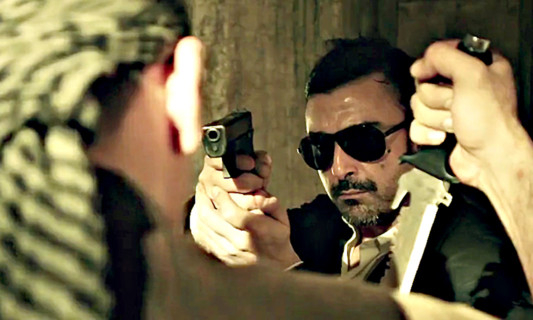
Dubai: Pakistani superstar Shaan Shahid (popularly known as Shaan) has a bone to pick with Indians and critics who have snubbed his controversial blockbuster Waar.
“I don’t think it’s an India-bashing film,” said Shaan in an interview ahead of his visit to Dubai to premiere his action thriller in the UAE on Thursday. “It’s based on the issues that people are facing right now.”
No action thriller has divided Pakistan quite as much as the English-and-Urdu feature, directed by Bilal Lashari. Shaan plays a retired military officer called in to thwart a terrorism plot in his country orchestrated by an extremist Taliban outfit and funded by Pakistan’s arch-rival and neighbour India. The big-budget thriller is a bit of James Bond with a good dose of chest-thumping jingoism thrown in.
“Every person has a right to be patriotic about his country,” said Shaan. “With all due respect as far as India is concerned, they have been making films bashing Pakistan left, right and centre anytime they want to. As an actor, I feel it’s OK because they are being patriotic Indians. For once if a Pakistani wants to be patriotic, the whole world has a problem with that.”
The actor, who has worked on more than 475 films, urged everyone to look at the bigger picture and take his latest blockbuster in their stride.
“If a film is made in Pakistan, we are going to say our views and we are going to say what we think is right,” he said. “The waar [strike, in Urdu] shown in the film is not against India but against Taliban. That is one problem we are facing right now. It is a proxy war and there has to be some hand behind it and we can nominate anybody.”
It seems to have worked wonderfully. In Pakistan, Waar beat Shah Rukh Khan’s Chennai Express at the box office in its opening weekend in October.
“It’s very exciting because after a very long time Pakistan is stretching its muscles as a film industry,” said Shaan. “We are finally breaking norms and boundaries. This is a happy moment because people can now see Pakistan as a place where they make good movies.”
It was also a series of firsts for this English-language feature film.
“This is the first that the army and government has stepped in to support art,” said Shaan, who adds that it’s up to artists like him to bridge boundaries between nations. “It’s a positive aspect because they gave us a lot of logistical support.”
He has hopes that Waar will get a theatrical release in India. “India should play a bigger brother and support our cause of cinema,” he said.
Both India and Pakistan have low tolerance for films that depict them in a bad light. Pakistan banned India’s Ek Tha Tiger from its theatres — it showed a Pakistani agent played by Katrina Kaif choosing her Indian lover (Salman Khan) over her country. The director of Waar has reportedly been asked to edit scenes that overtly demonise India to make way for an India release.
It remains to be seen if Indians will watch Waar in theatres, but its lead actor dreams of a world where Bollywood plays fair on the type of roles that Pakistani talent is offered. Shaan claims he had turned down a role in Aamir Khan’s blockbuster Ghajini because it showed the stereotypical image of a Pakistani villian bashed up by an Indian hero.
“I didn’t want to promote that ‘Pakistani bad guy’ notion,” he said. “We, as artists, need to cross these lines — Shah Rukh Khan comes here for private functions. They dance at shaadis [weddings] here but they don’t do activities for the people of Pakistan or for India to get together.”
Shaan also believes that Pakistani actor Ali Zafar, who has met with mediocre success in India with Bollywood films Tere Bin Laden and Meri Brother Ki Dulhan, have been shortchanged.
“All Pakistanis who have worked in Indian films have brought shame to Pakistan,” he said. “The kind of work they have done is below average. I would like to see Shah Rukh Khan, Ali Zafar, Hrithik Roshan in a film together playing main leads. That will give a clear message to actors in Pakistan.”
He also dreams of a world where artists turn into ambassadors for peace.
“Art is never about fundamentalism,” he said. “It speaks a universal language.”












